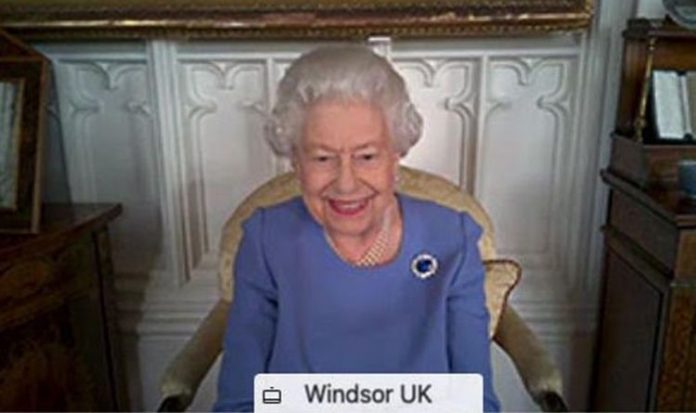During her first official royal engagement since returning from Sandringham, the monarch looked in good spirits as she joined the Countess of Wessex on a video call with eye care specialists from India, Sierra Leone, and Australia who are working with patients in their countries. It comes just days after Buckingham Palace confirmed Sophie was self-isolating after coming into contact with a person who later tested positive for coronavirus.
Royal aides said Sophie was self-isolating at home and was not experiencing any symptoms but simply following Government guidance on COVID-19.
The Queen has been settling back into life at Windsor Castle after spending a few weeks in the company of her husband Prince Philip at Sandringham.
The monarch returned to Windsor Castle this week to resume her work after a two-month-long summer break, while Prince Philip remained in Sandringham, which has become his main residence since retiring from royal duties.

The Queen was pictured back at work following her return to Windsor (Image: ROYAL FAMILY )

The Queen and Sophie joined a video call with eye care specialists from India, Sierra Leone, and Australia who are working with patients in their countries (Image: ROYAL FAMILY)
The head of state heard details about the Queen Elizabeth Diamond Jubilee Trust’s work helping to save the sight of people across the Commonwealth.
More than two years after the Queen had cataract surgery, she marked World Sight Day – celebrated on Thursday – by joining the Countess of Wessex on a video call from the Oak Room at Windsor Castle.
She listened to the heart-warming story of a blind fishmonger freed from dishonest customers after receiving sight-restoring operations thanks to a trust established in the monarch’s name.
READ MORE: Queen to award heroes with special gongs in Birthday Honours list

The Queen looked in good spirits as she joined the Countess of Wessex on a video call with eye care specialists (Image: GETTY )
Jelikatu Mustapha, 33, one of only four ophthalmologists in Sierra Leone, told the Queen about a 67-year-old patient, blind for four years with cataracts, who could not see people were regularly cheating her.
She said: ”A couple of weeks later she came back to us for follow up care with this huge bit of fish,” she said. “In the last two weeks since her surgery she had made more money than she had made in the three months before her surgery.”
“Now because she could see, and nobody could cheat her, she was making so much more money.”
DON’T MISS
Meghan Markle row: How Queen could be forced to strip Meghan of titles [REVEALED]
Republicans demand Queen stops Meghan Markle ‘interfering’ in election [COMMENT]
Queen pays emotional tribute to Commonwealth health workers [INFO]

The Queen has been settling back into life at Windsor Castle after spending a few weeks in the company of her husband Prince Philip at Sandringham (Image: GETTY )
The Queen asked how her work had been affected by Ebola, the virus that infected more than 14,000 in Sierra Leone between 2014 and 2016 and killed 3,955, more than in any other country.
She said: ”Well I was wondering, because I mean she must have experienced Ebola. So that must have been very difficult in Sierra Leone.”
Ms Mustapha told her she had been studying in Kenya at the time but the lessons learnt from Ebola had helped the West African country clamp down quickly on COVID-19 with bans on internal and foreign travel, meaning only a handful of people had the disease.

Royal Family tree mapped (Image: EXPRESS)
Sophie added: “Certainly the experience when I went to Sierra Leone was that they were very, very conscious of having had to deal with the Ebola crisis.
To which the 94-year-old monarch said: ”I’m glad that the Queen’s Jubilee has been able to do some good help for this particular thing of eye care,” she said.
The Countess, told her: “I think that’s somehow underplaying it, it’s been incredible. And certainly seeing in countries like Malawi being really able to tackle the issue of blinding trachoma.
“Many of the African nations are actually very close to being able to declare that they have got on top of and are eliminating this disease.
“So it’s very exciting. The legacy of the fund will go on for many, many years because it has also been able to highlight the problems and the importance of eye care to other governments who are actually placing it slightly further up the healthcare system than it has been before.”
Six years ago, governments and other donors from around the Commonwealth gave £100 million to the Queen Elizabeth Diamond Jubilee Trust to mark the monarch’s 60 years on the throne and much of that money was used to treat people with sight problems.







